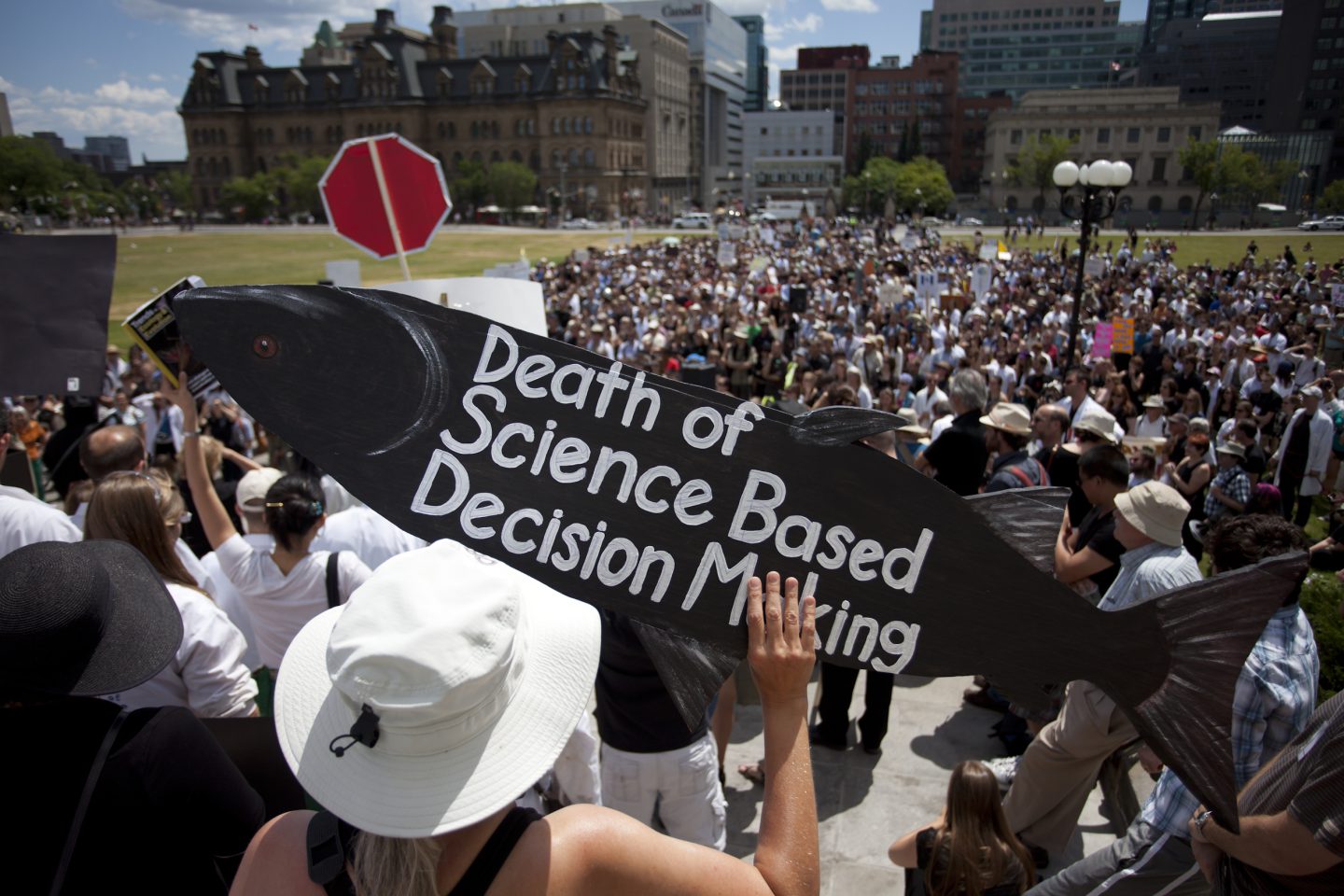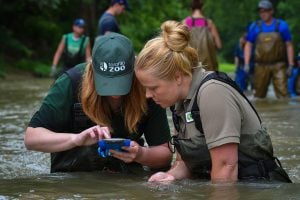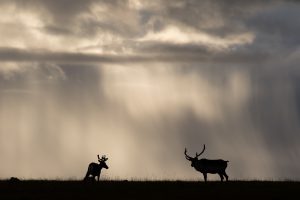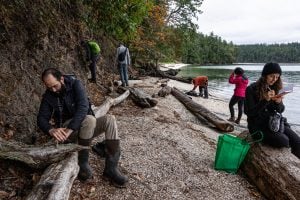
Environment
The sixth extinction
The planet is in the midst of drastic biodiversity loss that some experts think may be the next great species die-off. How did we get here and what can be done about it?
- 4895 words
- 20 minutes
This article is over 5 years old and may contain outdated information.
Environment

Last summer, eleven species were added to Canada’s national registry of Species at Risk, among them the horned grebe – a small, black-and-white waterbird native to the Prairies that is now listed as being of Special Concern due to various threats to its wetland habitat.
The news was welcomed with relief by conservationists; not only did the additions represent the first update to the list in six years (the horned grebe had been awaiting protection even longer, since 2009), it also signalled the new Trudeau government’s intention to follow through on commitments made during the 2015 election to return to evidence-based environmental policy.
According to a study published July 25 in the journal Conservation Biology, the backlog of species awaiting designation in Canada is just one example of what can happen when scientific evidence is stifled by a lack of political will, or worse, outright hostility from those in power — and why, the study’s authors say, protections for scientific integrity should be more tightly woven into the fabric of government.
“With the stroke of a pen, a normal, functioning scientific process that brings evidence to decision makers can be shut down,” says Jeremy Kerr, a University of Ottawa Research Chair in Macroecology and Conservation and a co-author of the study. “Whether it’s evidence that decides if we will have monarch butterflies in the future, or whether our medicines are safe for use, that transparency can disappear in an instant.”
From suppression to reform
In Canada, the independent advisory board known as the Committee on the Status of Endangered Wildlife in Canada (COSEWIC) studies wildlife population trends and makes protection recommendations, but a species receives no formal protection under the Species at Risk Act (SARA) until the federal cabinet acts on COSEWIC’s advice. A 2016 investigation by Vice News referenced in the study found that during the last five years of the Harper administration, the minister of the environment simply stopped bringing COSEWIC recommendations to cabinet, delaying protection of as many as 198 species, subspecies, and distinct populations in Canada.
This kind of exploitation of legislative loopholes is not unique to Canada, nor was the eventual outcry from government scientists tired of having their research and communications muzzled under Harper. The study looked at various administrations in Canada, the United States and Australia between 2003 and 2016 and their relationship with government and non-government scientists and found a pattern.
“The timelines varied in each country, but they all sort of followed a similar trajectory,” says Katie Gibbs, Executive Director of Ottawa-based advocacy group Evidence for Democracy and another co-author of the study. “Where we saw a government come into power that introduced some threats or abuses to scientific integrity, we saw increased engagement from the scientific community pushing for reforms. Then we would see new governments come into place verbally committing to the principles of scientific integrity, but we’ve seen various levels of actual change.”
Safeguarding transparency
The study recommends several policy reforms governments can enact to safeguard open scientific communication, such as updating freedom of information laws to make publicly-funded research more accessible, establishing processes for independent oversight and review, and building the right to speak publicly into scientists’ collective bargaining agreements — something the union representing Canada’s government scientists has done.
However, Gibbs acknowledges that any legislative action can be easily reversed, which is why, she says, it’s also important to reinforce a culture of respect for evidence-based decision-making within the public service. This could mean rewarding government scientists for getting research published in peer-reviewed journals or making presentations at conferences, and encouraging membership in professional scientific organizations.
“Science associations and science advocacy organizations really have a role to play in continually pushing for these issues,” Gibbs says. “It’s not enough for a new government to come in every few years and say, ‘We’re not going to muzzle scientists;’ we need to keep pushing for greater transparency long-term, even under science-friendly governments, to ensure we’re getting that deep-ingrained change.”
Individual scientists, too, must be willing to speak in their own defence, says Kerr. In 2013, he was one of hundreds of scientists and concerned citizens who rallied on Parliament Hill to protest the Harper government’s cuts to government research and the muzzling of federal scientists.
“Scientists have to be willing to defend evidence,” he says. “That doesn’t mean take a political stand, but we have to be willing to stand for the evidence, and we have to be willing to do it publicly. We have to be willing to be fearless champions for factual information.”
Are you passionate about Canadian geography?
You can support Canadian Geographic in 3 ways:

Environment
The planet is in the midst of drastic biodiversity loss that some experts think may be the next great species die-off. How did we get here and what can be done about it?

Environment
A new study finds zoos and aquariums in Canada are publishing more peer-reviewed research, but there is still more to be done

Wildlife
After more than a million years on Earth, the caribou is under threat of global extinction. The precipitous decline of the once mighty herds is a tragedy that is hard to watch — and even harder to reverse.

People & Culture
Naming leads to knowing, which leads to understanding. Residents of a small British Columbia island take to the forests and beaches to connect with their nonhuman neighbours